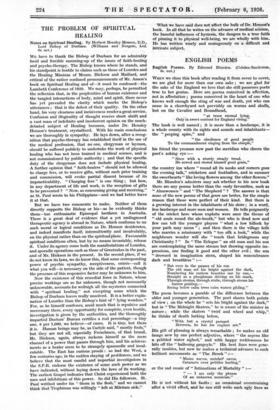THE PROBLEM OF SPIRITUAL HEALING WE have to thank the
Bishop of Durham for an admirably lucid and forcible summing-up of the issues of faith-healing
and psycho-therapy. The Bishop knows where he stands, and his standpoint is hostile to claims such as those of Lourdes and the Healing Missions of Messrs. Hickson and Maillard, and critical of the rather confused pronouncements of Mr. Anson's book on Spiritual Healing and of—it must be confessed—the Lambeth Conference of 1920. We may, perhaps, be permitted the reflection that, in the perplexities of human existence and the tangled interactions of body, mind and spirit, there never has yet prevailed the clarity which marks the Bishop's utterances ; that is the defect of their quality. On the other hand, his very clearness and incisiveness render a great service.
Confusion and illogicality of thought receive short shrift and a vast mass of indefinite and incoherent opinion on the much- debated subject of Healing becomes, under Dr. Hensley Henson's treatment, crystallized. With his main conclusions we are thoroughly in sympathy. He lays down, after a recog- nition that psycho-therapy has established itself in the use of the medical profession, that no one, clergyman or layman, should be suffered publicly to undertake the work of physical healing who has not been trained in medical science, and is not commissioned by public authority ; and that the specific duty of the clergyman does not include physical healing.
A further opinion that " faith-healers " should not be allowed to charge fees, or to receive gifts, without such prior training and commission, will evoke partial dissent because of its impracticability. " Charging fees " is one thing ; but how, in any department of life and work, is the reception of gifts to be prevented ? " Now, as concerning giving and receiving," as St. Paul wrote to his Philippians—and we had better leave it at that.
But we have two comments to make. Neither of them directly supports the Bishop or his—as he evidently thinks
them—too enthusiastic Episcopal brethren in Australia.
There is a great deal of evidence that a yet undiagnosed therapeutic agency is abroad in Nature, which conforms to no such moral or logical conditions as Dr. Henson desiderates, and indeed manifests itself, intermittently and incalculably, on the physical rather than on the spiritual plane. Favourable spiritual conditions often, but by no means invariably, release it. Under its agency come both the manifestations of Lourdes, and sporadic operations such as those of Greatrakes in the past, and of Mr. Hickson in the present. In the second place, if we do not know its laws, we do know this, that some corresponding power of psychic sympathy, receptiveness, entree call it what you will—is necessary on the side of the patient, though the presence of this responsive factor may be unknown to him. Now the existence of this remedial force in Nature, whose precise workings are so far unknown, though not necessarily
unknowable, accounts for wellnigh all the mysteries connected with " spiritual healing," not excepting some which the Bishop of Durham leaves really unsolved. It is a better expla- nation of Lourdes than the Bishop's hint of " lying wonders." For, as he himself confesses, amid much that is repulsive and mercenary there, every opportunity for complete, even hostile, investigation is given by the authorities, and the 'thoroughly impartial Doctors' Bureau certifies a real percentage—a tiny one, 8 per 1,000, we believe—of cures. It is tiny, but there it is. Human beings may be, as Carlyle said, " mostly fools," but they are not all, 'especially Frenchmen, of that brand. Mr. Hickson, again, always reckons himself as the mere channel of a power that passes through him, and his achieve- ments as a healer seem to be strangely spasmodic and incal- culable. The East has curious proofs : -so had the West., a few centuries ago, in the sudden staying of pestilences, and we believe that the most candid and impartial investigators in the S.P.R. endorse the existence of some such power as we have indicated, without laying down the laws of its working. The earliest Gospel indicates that Christ experienced both the uses and inhibitions of this power. So did His followers. St. Paul writhed under his " thorn in the flesh," and we cannot think that Trophimus was wiffingly " left at Miletum sick."
What we have said does not affect the bulk of Dr. Henson's book. In all that he writes on the advance of medical science, the baneful influences of hysteria, the dangers to a true faith of pinning it to physical well-being, we are wholly with him. He has written wisely and courageously on a difficult and intricate subject.


























































 Previous page
Previous page